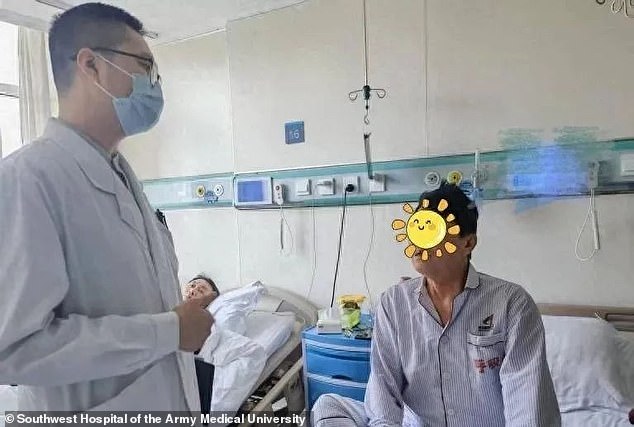A Chinese man’s bizarre habit of sniffing his dirty socks landed him in hospital after it led to him developing a serious fungal infection in his lungs.
The unnamed man, described as an ‘ordinary office worker’ from Chongqing in southwestern China, attended hospital after developing a severe cough that was keeping him awake at night despite him taking over-the-counter medications.
Medics who treated the patient told local media that medical scans revealed worrying signs of a severe infection in the man’s right lung.
Doctors then performed a bronchoscopy, a procedure where they used a thin and flexible tool, to take samples from the inside of his throat.
Analysis of these samples revealed the patient had aspergillosis a type of lung disease caused by aspergillus a type of mould which thrives in damp locations.
An interview with the patient, to try to uncover where he might had been exposed to the fungus, revealed he frequently smelled his socks after wearing them for long periods.
Medics then tested his socks and found they indeed contained the same strain of mould which had infected their patient.
Luo Hu, deputy director of the Department of Respiratory Medicine at the Southwest Hospital of the Army Medical University, told local media the socks had provided the perfect breeding ground for the fungus.

The unnamed man, described as an ‘ordinary office worker’ from Chongqing in southwestern China, (pictured right) attended hospital after developing a severe cough
‘Wearing shoes for a long time forms a closed, humid, and warm space, which is easy to breed fungi,’ he said.
‘If you smell or absorb fungus-filled socks, the fungi may enter the lower respiratory tract through the mouth and nose.
‘If the body’s immune function is low, it may cause diseases such as fungal pneumonia.’
Medics said the patient responded well to anti-fungal medications and has since been discharged from hospital.
Bizarrely, this isn’t the first time a Chinese man has been hospitalised after smelling his own socks in similar circumstances.
In 2018, local media detailed the case of a 37-year-old man from Zhangzhou, in the nation’s south east, who was admitted hospital with cough and chest pains.
When interviewed by medics, the patient told them that he had been ‘addicted to smelling his socks that he had been wearing’.
Medics then found his ‘addiction’ had led him to catch a fungal lung infection from spores that had developed in his footwear.

A Chinese man’s bizarre habit of sniffing his socks after wearing them all day landed him in hospital after he developed a serious fungal infection in his lungs. Stock image
Speaking at the time, Dr Mai Zhuanying at the Zhangzhou No. 909 Hospital said another factor in the case was that the man had not been getting enough sleep due to looking after his child.
This, the medic said, may have lowered his immune system and made him more vulnerable to these types of infections.
The NHS says aspergillosis is rare in healthy people but patients with lung conditions like asthma or those with a weakened immune system, like cancer patients, are at higher risk.
Symptoms of aspergillosis include breathing problems, coughing up blood or lumps of mucus, a high temperature, unintended weight-loss and fatigue.
In severe cases it can lead to potentially fatal bleeding in the lungs or pneumonia a dangerous inflammation of the lungs.
It can also spread to other parts of the body like the heart and the brain.
It is the latter, called invasive aspergillosis, which is the most deadly killing up to 88 per cent of patients with weakened immune systems who develop it according to some studies.
The NHS says the fungus which causes aspergillosis is almost impossible to avoid given how common it is.
However, it advises patients at risk of the condition to avoid exposure to compost heaps and piles of dead leaves where it is most frequently found.
They are also advised to ensure they keep their home well ventilated, as well as heated in winter, to reduce the chance of the fungus taking hold indoors.
Treatment for aspergillosis varies depending on the extent of the condition.
Most patients can be treated with ant-fungal medications, though some will need to take these for life.
In some cases, surgery may be required to remove ‘balls’ of fungal growth which can develop in the lungs.
This article was originally published by a www.dailymail.co.uk . Read the Original article here. .


